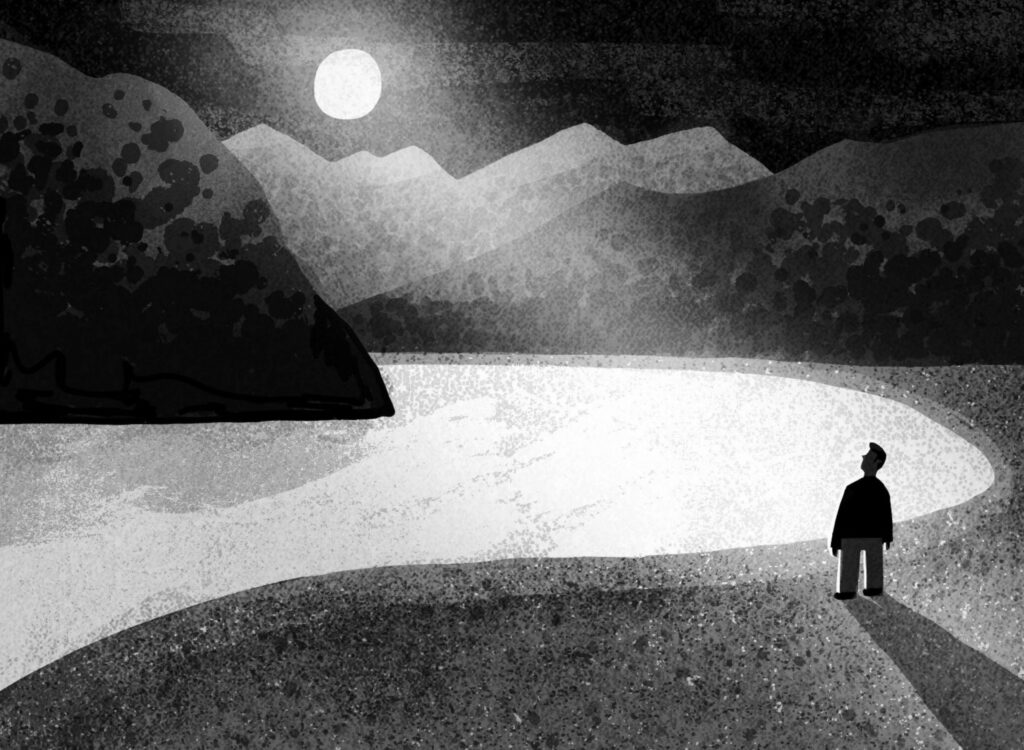At first glance, Augustino ou l’illumination (Augustino or illumination) is a melancholy finale to Marie-Claire Blais’s oeuvre. The slim volume contains seventy pages left behind by the Quebec writer, who died suddenly on November 30, 2021. Yet, even in fragmentary form, the text testifies to the fact that Blais’s career was never going to wrap up neatly. She would not have stopped writing while still alive.
Blais roared onto the literary scene in 1959, when she published the gothic fable La belle bête (published in English as Mad Shadows) at the age of twenty. More than two dozen novels followed over the next sixty years, in addition to works of poetry, drama, and non-fiction. Her accolades include the Prix Médicis and four Governor General’s awards. In such a career, it is hard to identify a crowning achievement, but Blais’s most read novel likely remains Une saison dans la vie d’Emmanuel (A Season in the Life of Emmanuel ), from 1965, a macabre take on rural Quebec that fits nicely into the post-secondary curriculum. Les nuits de l’Underground (Nights in the Underground), which depicts Montreal’s lesbian scene in the 1970s, is the candidate to make Blais a queer icon for Generation Z. (She was long associated with the American painter Mary Meigs.) But the author’s most ambitious undertaking began in 1995 with Soifs (These Festive Nights), a novel anchored in her adopted home of Key West, Florida. With a nod to Virginia Woolf’s The Waves, it features a chorus of characters who reflect on mortality and contemporary society. Blais completed eleven books in what would become the Soifs series, and Augustino ou l’illumination is the trace of the twelfth.
The opening lines to this last work make for a good introduction to the project as a whole: “You must be everywhere that life reigned, understand everything, know everything, thought Augustino, no longer limit yourself to inhabiting your own body, but recognize living bodies and the bodies in ashes whose odour he inhaled close to the beach.” Far from embracing a singular perspective, the Soifs novels depict the stream of consciousness of dozens of characters in multiple locations. They are written without paragraph breaks and with few periods, such that the narrative voice drifts from mind to mind in the middle of sentences that stretch for pages. Likewise, the dead coexist with the living. The final volume begins in the early twenty-first century in India; the burning bodies on Augustino’s mind most obviously refer to cremation on the banks of the Ganges. The reference expands, however, as other threads describe the Holocaust, histories of lynching in the American South, and the war in Vietnam.
The character of Augustino first appears as a child in the original Soifs novel and as a precocious writer in the third. Now an adult, he has fled South Florida for India as a way of escaping “the uselessness of his generation,” epitomized by “stupid young vacationers, gleeful in the face of poverty . . . already rotten to the bone.” A young aid worker, who insists on the existence of altruism, challenges Augustino’s cynicism. Other sections detail the thoughts of the “Grand Secretary,” a version of the former United States defence secretary Donald Rumsfeld and the subject of Augustino’s own book-in-progress. In a typical metafictional move, Blais uses a figure who is a writer himself as her proxy to imagine Rumsfeld’s interiority and to extend her story’s reach to the news headlines.

Contemplating mortality and contemporary society.
Sandi Falconer
As Élisabeth Nardout-Lafarge of the Université de Montréal observes in the book’s preface, “ ‘evil’ is never external, foreign, ‘barbaric’ ” for Blais. “It is in us, inherent to our condition.” The grand secretary, who lounges on his ranch in Mexico, is clearly a villain, the unrepentant architect of the war in Iraq that has cost the lives of thousands. Yet we are invited to consider his perspective, as he fantasizes about slaying a tyrant and suppresses his own conscience. He likewise points to a moment when he rescued a wounded soldier’s dog as evidence that he “was above all human, that all accusations of his inhumanity would be fundamentally a mistake.”
As fate would have it, the last part of the novel that Blais was able to complete is from Rumsfeld’s point of view: “I was right to unleash this conflict that should only have lasted a few days, as I foresaw, but that continued for too long, because now we know, wars always engender other wars, other openings and reopenings of hostilities, it’s sadly this way.” The irony is thick in this passage: all of the Soifs novels reference the repetitive nature of violence and hatred. There is nothing new about this lesson, even if it must be constantly relearned by those who, for their own convenience or as part of a personal search for glory, choose to forget.
It seems unlikely that Blais’s death will lead to a cottage industry of posthumous publications, like the one that developed following the Chilean novelist Robert Bolaño’s passing in 2003. She was prolific enough during her lifetime that this is not too acute of a loss. Nor does it seem accurate to dub the Soifs cycle unfinished. These novels are driven more by existential concerns than by plot or characterization. Blais’s return to this form over the past few decades suggests that it had become the lens through which she viewed the world, an inexhaustible narrative mode that led her to begin yet another novel at eighty-two. Such a project never ends. It can only be interrupted.
Amanda Perry teaches literature at Champlain College Saint-Lambert and Concordia University.

